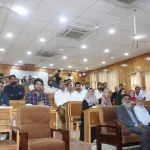Self-medication, the use of over-the-counter drugs or home remedies without professional guidance, has become increasingly common due to easy access to medicines, time constraints, and cost-saving motives. While it may offer temporary relief, it poses serious risks, including misdiagnosis, drug interactions, and delayed treatment of underlying conditions.
In an interview with Rising Kashmir’s health correspondent, M Peerzada, Dr Akhtar Purvez, a renowned Kashmir-born researcher, pain physician, and author of Managing Chronic Pain in an Age of Addiction and The Brain Behind Pain, highlights the dangers of self-medication and emphasized the need for health literacy and consulting qualified professionals to ensure safe healthcare practices.
What is self-medication, how prevalent is it today in Kashmir?
Self-medication refers to the practice of using drugs, including over the counter (OTC) medications, herbal remedies, or prescription drugs without a medical professional’s guidance. In the Kashmir Valley, it has become increasingly prevalent due to factors like easy availability of medicines, lack of regulatory enforcement, and limited healthcare access. Recent studies and reports suggest that a significant portion of the population engages in self-medication, often leading to adverse health outcomes.
What are its common reasons?
The main reasons for self-medication in Kashmir appear to be the following: first limited access to healthcare facilities and professionals, especially in rural or remote areas. On top of it, the financial constraints that make people avoid professional medical consultations. Cultural beliefs and general trust in traditional remedies plays an additional role as does the long waiting times at hospitals and clinics. On top of it, easy access to OTC medications at pharmacies without prescriptions is an important factor.
How can people limit serious risks and complications due to excessive use of painkillers?
General population can limit the risks from excessive use of painkillers by consulting healthcare professionals before taking painkillers or any medications. In addition, we need to avoid long-term or high-dose use of non-steroidal anti-inflammatory drugs (NSAIDs) including drugs like ibuprofen (Brufen).
It is important to stay hydrated and monitor kidney and liver function if chronic pain management is required.
A supplemental approach would be to use non-pharmacological pain management methods such as physiotherapy or lifestyle changes.
Are there certain types of medications that are more commonly self-prescribed than others?
Yes, the most common self-prescribed medications include painkillers (e.g., ibuprofen (Brufen), paracetamol (Crocin, Calpol) and antibiotics, often taken without completing the full course. Other medications include antihistamines and allergy medications. Cold and flu medications, supplements and vitamins are usually self-prescribed and can be risky.
What risks are associated with self-medication?
The risks of self-medication include incorrect self-diagnosis leading to inappropriate treatment. In addition, they can have potential side effects and adverse drug reactions that could worsen health conditions. Additionally, there is the risk of dependency and overuse, particularly with painkillers and sedatives. Improper use of antibiotics can lead to increased chance of antimicrobial resistance.
What is Antimicrobial Resistance (AMR), and why is it a concern?
Antimicrobial Resistance (AMR) occurs when microorganisms such as bacteria, viruses, fungi, and parasites become resistant to the drugs designed to kill them. This makes standard treatments ineffective, leading to persistent infections and a higher risk of disease spread, severe illness, and death. AMR is considered a hidden pandemic as it threatens to reverse decades of medical advancements and could lead to a future where minor infections become lethal.
Does the availability of information online contribute to self-medication practices?
Yes, the abundance of health information online can encourage people to self-medicate, as they may believe they have enough knowledge to manage their conditions without professional help. However, the accuracy and reliability of such information can vary greatly, leading to misuse and health risks.
How does the lack of access to healthcare in certain areas impact rates of self-medication?
In areas with limited healthcare access, people are more likely to self-medicate due to the unavailability of medical professionals and facilities. This leads to reliance on OTC medications and traditional remedies as a primary means of addressing health issues, often without understanding the potential consequences.
How can prolonged self-medication lead to resistance or dependency issues?
Prolonged self-medication, especially with antibiotics, can lead to antimicrobial resistance, making infections harder to treat. Similarly, habitual use of painkillers or sedatives can result in dependency and addiction where individuals need larger doses over time to achieve the same effect, posing significant health risks and potential for abuse.
What steps can people take to reduce the risks if they feel the need to self-medicate?
To minimize risks, patients should consult healthcare providers before taking new medications. They need to follow dosing guidelines strictly and avoid prolonged use without supervision.
In addition, they should use reliable sources for health information and avoid assuming that all online advice applies to their specific condition.
A safety measure includes maintaining a complete record of medications taken and reporting it during medical consultations.
Are there any educational resources or campaigns that could effectively reduce unsafe self-medication practices?
Public health campaigns focusing on the risks of self-medication and safe drug use, supported by community outreach programs, could significantly reduce unsafe practices.
Educational resources such as workshops, informative pamphlets, and digital content in local languages can be very effective in raising awareness.
How can the healthcare system better support people to discourage self-medication?
Healthcare systems can improve access to primary care facilities, especially in remote areas. They need to strengthen regulations around the sale of prescription medications.
There is a need to train healthcare providers to educate patients on the risks of self-medication and implement public health education programs.
What role can pharmacists play in educating people about self-medication risks?
Pharmacists can play a crucial role by providing counseling to patients on the appropriate use of medications. They need to refuse to sell prescription medications without a valid prescription.
They also can help educate customers on the risks associated with self-medication and promoting safer practices and guiding individuals toward professional medical advice, when needed.
Summarizing, self-medication is a serious risk in both the developed and developing countries and communities and regulating agencies need to do everything to safeguard the health and safety of their populations.








